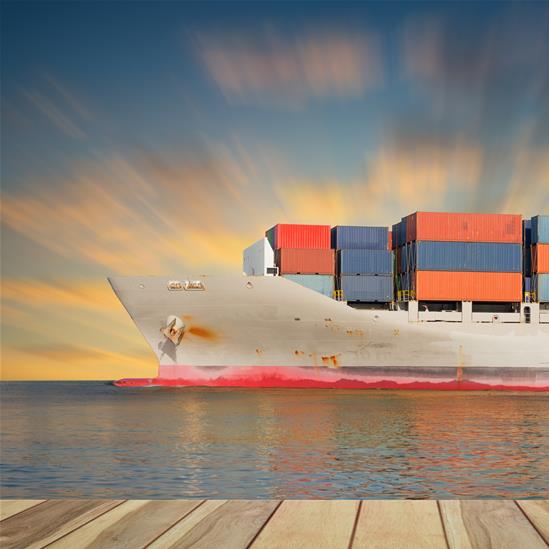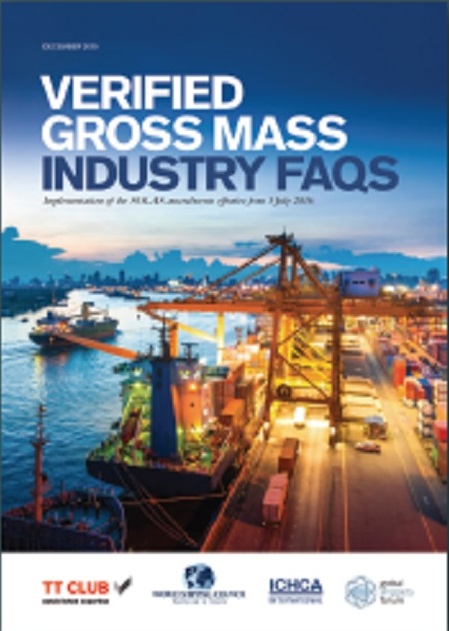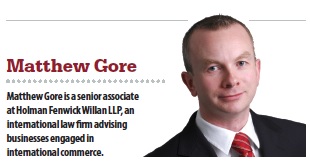Although The Mover published an in-depth article on container weighing regulations in December 2015, we believe the subject to be of such importance that a further reminder is justified. Here Matthew Gore looks at the subject again and includes his comments on the insurance implications of the new regulation.

From 1 July, 2016 it will be mandatory for every packed export container to have its weight verified before being loaded onto a ship. This relatively modest amendment to the International Maritime Organization (IMO) Safety of Life at Sea Convention (SOLAS) is set to have significant practical implications across the international removals sector for containerised shipments, as movers and ocean carriers attempt to incorporate these new weighing requirements into their existing procedures. The ramifications of the SOLAS amendments will go beyond just the implementation of weighing procedures however and supply chain participants should be aware of any potential changes to their insurance coverage as a result of the new regulations.
The amended SOLAS Regulations
The IMO has amended SOLAS to now require all export containers to have a verified gross mass (VGM). The shipper (as named on the bill of lading), which is likely to be the international mover, is ultimately responsible for obtaining the VGM and no packed container should be loaded on board a ship where the ocean carrier and port terminal operator has not been provided with a VGM.
The new regulations are to be implemented in each jurisdiction by the ‘competent authority’, which in the UK is the Maritime and Coastguard Agency (MCA). The MCA has produced a helpful guidance note (MGN 534 (M+F)) on the regulations, which provides full details of the two recognised methods available to shippers and forwarders operating in the UK to obtain a VGM.
Method 1 establishes a VGM by weighing a packed container, for example through the use of a weighbridge, whereas Method 2 calculates the total weight of the empty container (its tare weight) together with the aggregate weight of its contents including any packaging, packing materials and dunnage, etc. If the shipper intends to use Method 2, the UK regime will require them to obtain accreditation from the MCA in order to become a ‘verified weigher’.
From a practical perspective, it would be highly impractical for international movers to employ Method 2 as this would potentially require the shipper or international mover to weigh cargo (which is most commonly individual cases of personal effects, household goods and furniture) separately. It is more likely that international movers will instead be reliant on Method 1 and obtain a VGM through weighing the packed container.
Where international movers do not have the capacity to weigh the containers they pack themselves, they will be reliant on third parties to obtain a VGM and then pass on the additional costs of such services to their customers. International movers may wish to investigate the network of available weighing facilities which offer a minimum deviation from the main routes to port terminals as inevitably hauliers will pass on additional costs for time and mileage incurred. Similarly international movers will be forced to pass such costs on to their customers as well.
International movers will need to communicate with their forwarders or carriers to establish clear procedures for obtaining and disclosing the VGM for export containers.
Insurance Implications
The SOLAS amendments were primarily introduced to improve ship stowage and container safety following high-profile incidents such as the grounding of the ship ‘MSC Napoli’ off the south coast of England in 2007. Whilst not a direct driving force behind the SOLAS amendments, the insurance industry will undoubtedly welcome the new requirements. Losses resulting from the loading and unloading of containers are often caused by inaccurate declarations of container weights, so any regulations aimed at reducing the frequency of such incidents are likely to be well received.
Industry consensus suggests that the SOLAS amendment is unlikely to have little (if any) adverse impact on insurance premiums and could even see reductions in the long term if safety records improve. Crucially however, from a contractual standpoint there remains a considerable degree of uncertainty within the market as to the potential impact of the new regulations. There have been some suggestions that a new insurance product may be required to cover liability arising from losses from incorrect disclosure or non-disclosure of VGM. Existing cargo policy exclusions may be widened to extend to inaccurate weighing of containers.
The bottom line remains that 1 July ,2016 will soon be upon us and the shipper (as named on the bill of lading) remains ultimately responsible for the declaration of VGMs.
Industry coalition offers advice
 The World Shipping Council (WSC), the TT Club, the International Cargo Handling
The World Shipping Council (WSC), the TT Club, the International Cargo Handling
Coordination Association (ICHCA), and the Global Shippers’ Forum (GSF) have recently released a new Frequently Asked Questions (FAQ) document to address issues arising from the new container weighing regulations due to take effect globally on 1 July, 2016.
This document seeks to clarify how the SOLAS container weight verification
requirements will function in various situations. It identifies commercial and operational arrangements that will have to be addressed, and it flags issues that must be dealt with by national governments. The FAQs are based on actual questions from affected stakeholders, and they will be expanded as new issues emerge. Stakeholders are invited to approach any of the collaborating organisations with additional questions that may come up. Contact details of ‘subject-matter experts’ from each of the organisations can be found at the end of the FAQs document.
● The FAQs document can be accessed at www.globalshippersforum.com.
